VoIP Call Center
Want to deliver next-level customer service? Empower your team today by customizing Vonage Business Communications (VBC) features into a Voice over Internet Protocol (VoIP) call center. VoIP call centers use cutting-edge technology to do so much more than a traditional landline system can.
Speak to an expert and find out what VoIP call center solutions can do for your business.
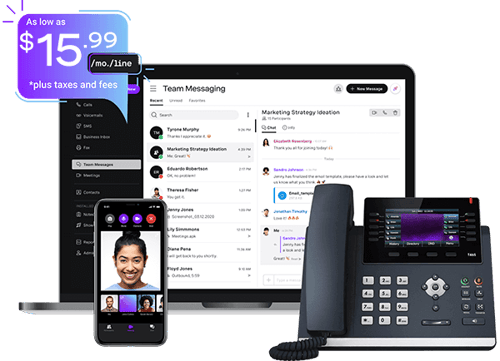
Thanks for reaching out!
We'll get back to you as soon as we can. In the meantime, feel free to explore more about Vonage and how we're making communications more flexible, intelligent, and personal so our customers can stay ahead.
Leverage VBC Features to Build the Best VoIP Call Center Solution for Your Business
More than ever, businesses are recognizing the advantages of VoIP for supercharging their communications. But how well can Vonage’s UCaaS solution, VBC, handle the call center functions you rely upon for your day-to-day operations? You might be surprised! Take a look:
Auto Attendant
Missed calls causing a headache? Not with our Auto Attendant—also sometimes called a Virtual Receptionist. This fully customizable feature provides callers with a list of options based on your organization’s work hours and scheduling needs. With Auto Attendant, no call ever goes unanswered.
IVR
Get more out of your existing applications by adding a simple Interactive Voice Response (IVR) script. This handy feature uses pre-recorded voice prompts to direct customer calls to your business. IVR routes calls quicker and declutters operations. What’s more–it frees up your call center team to focus on dealing with more complex inquiries.
Receptionist Console
If your organization takes a particularly high volume of calls, you need a VoIP call center solution that’s up to the task. Assign Vonage’s Receptionist Console add-on to a single user extension, and then be able to handle up to 50 calls at the same time.
Call Queuing
Sometimes, call volumes suddenly spike and there just aren’t enough staff on duty to service all customers immediately. With Call Queue, you can give callers the option to stay in a virtual waiting room until one of your representatives becomes available.
Call Forwarding
Going on a business trip but need to make sure you can take that vital client call? It’s simple with Call Forwarding. This flexible function allows you to route any call to any device you like, meaning you can still be “in the office” and accessible, even when you’re out and about.
Call Groups
For teams that respond to calls collectively, you can set up a Call Group. Each group can have a single direct dial number and a group extension for routing calls within the system. It can even have its own dedicated voicemail box.
Call Logs
Leverage analytics to supercharge efficiency by taking advantage of detailed call logs. You can access any call record by extension or account — simply log into your Admin Portal and run a report query. Ideal for when you want to drill down into the data.
Cross-Device Compatibility
With a VoIP call center phone system, you’re not bound to specific pieces of equipment. As long as you have a stable connection, you can route calls to any internet-enabled device. So whether your team works on site or remotely, they’ll be delivering the same top-tier service.
Local and International Numbers
Show your commitment to your customers by giving them the option to call you on numbers that are convenient for them. You can have a single international number or a local number for any market, meaning callers can get in touch from anywhere without having to pay extra.
What Is a VoIP Call Center?
A call center is an organization or business department set up to make or take calls at volume, usually to or from prospective or existing customers. VoIP call centers use an internet connection to enable you to place and receive calls rather than utilizing the traditional phone network.
Modern call center VoIP systems provide an abundance of features that give you a wide array of options for optimizing your communications. As well as phone calls, they can often handle video and other digital contact options.
That means you can benefit from all the features you would expect as standard from a traditional system, but with many more.
You can also link your call center VoIP software to other applications via an extensive suite of integrations. Your customer service team can use these integrations to pull all the information they need to deal with queries at lightning speed, so your customers get world-class service every time.
Security and compliance
Secure communications that meet your industry’s regulatory requirements. See VBC Security & ReliabilityThe 99.999% claim is based on Vonage's average up-time and/or availability.
Benefits of Switching to a VoIP Call Center Solution
Why make the switch? Because when you do, you’ll be able to take advantage of some terrific benefits:
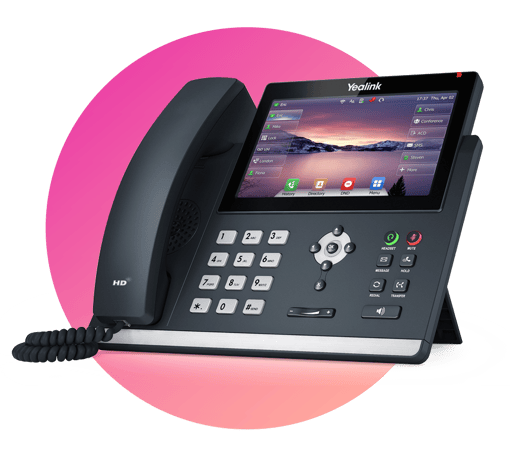
Greater Cost-Efficiency
Say goodbye to having to buy, maintain, and upgrade expensive and bulky equipment. With a call center built upon VoIP technology, you don’t need a costly wired phone infrastructure in your building.
If you already have a traditional phone system in place, you will probably be able to retain and reuse much of your existing equipment, such as headsets. But the great thing is that you no longer need to worry about budgeting for maintenance like the latest phone models or network upgrades.
There’s good news when it comes to the cost of calls. VoIP calls are typically cheaper than ones placed on a legacy landline, so every single time your team places an outbound call by VoIP, your business is saving money.
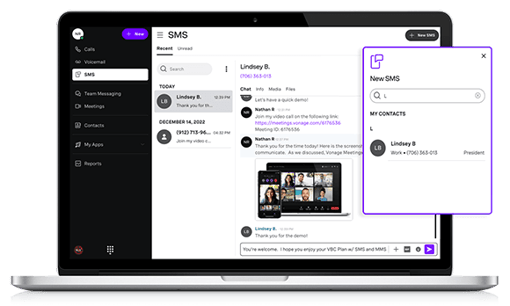
Improved Flexibility and Scalability
The ability to log in using any device no matter where you are in the world offers you the ultimate flexibility. VoIP call centers are a global solution for the modern workplace. No matter where in the world your employees work, the VoIP call center makes sure they’re all connected.
Is your business expanding fast? Good for you! That means you need to be able to scale everything up quickly, and that includes your call center capacity. With VoIP-based call center solutions, you can grow your capability as quickly as you need to without a problem.
You can add lines quickly and easily just by buying additional access, increasing capacity pretty much instantly. All you need to do is set up your new representatives in the system, and you’re good to go.
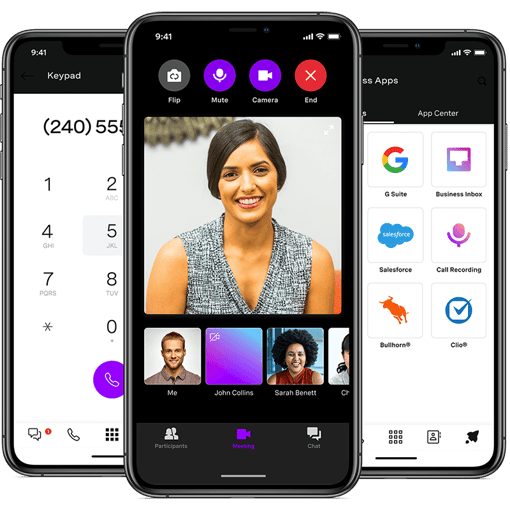
Ease of Set Up and Usability
The easy set up and usability that comes with a VoIP call center saves you time in learning — and training employees — on a complex system. The user-friendly interface helps your agents take to the new system like ducks to a full-service duckpond. And because there’s no need for specialized equipment with this call center, you can handle calls and manage users from any internet-connected device.
With the Vonage Admin Portal, you can customize your platform in any way you like, suiting your particular business needs. A Vonage expert can help guide you through setting up your Admin Portal options step by step.

Broader Features and Capabilities
To take your call center communications to a whole new level, there are integrations with all kinds of business apps. Why not integrate your call center with your customer service management tool, for instance? That way, your system can use the information you already have about customers to route their call to the best agent for their needs.
And one of the great things about using a VoIP service for call center tasks is that you get a lot more bang for your buck when it comes to features versus traditional landline systems.
Sure, you’ll still be able to make full use of the functionality you have come to expect, like call forwarding, call queuing, and more. But you’ll also get access to a whole array of new and incredibly useful features. These may include:
IVR
Intelligent routing
- AI-driven, in-call agent assistance
Custom dashboards
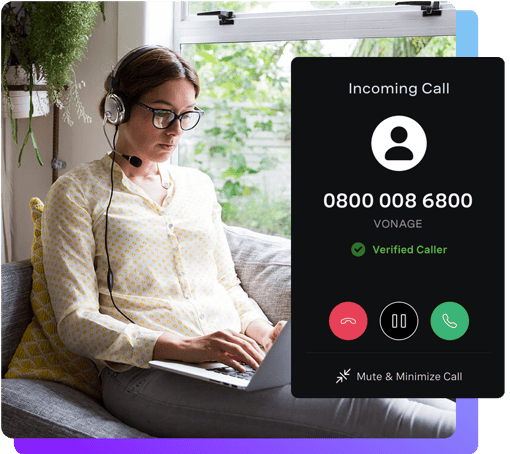
Suitable For Remote and Hybrid Work
Modern work settings need modern solutions. While there are many challenges in managing workforces — remote or hybrid — deploying VoIP for call centers means that communication doesn’t have to be one of them.
With a VoIP call center, all that your employees need to do their jobs is an internet-enabled device and access to your system. Working from anywhere in a globalized market can be very useful.
Allowing employees to work remotely can widen your hiring pool dramatically. If it’s not necessary for everyone to be on site to perform their roles, you can attract the top talent from various locations.
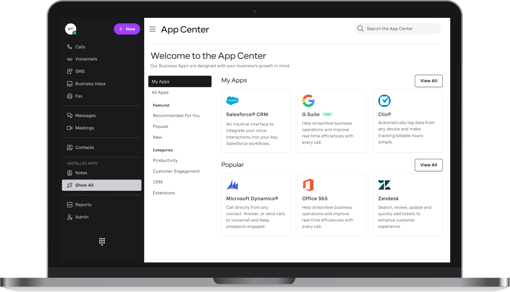
Integration With Existing Tech Stack
Concerned that switching to VoIP might create conflict with your existing tech stack? Don’t be. VoIP call centers are specifically designed to fit over the top of your legacy system.
There may even be some pieces of hardware that you’d like to retain, and that’s absolutely possible. For instance, you can use many traditional phones with VoIP systems just by plugging them into an adapter.
All this means that you don’t have to worry about the possibility of large amounts of costly downtime when you make the switch. Instead, the transition will be so seamless that your customers won’t even notice it.
How to Tell if Your Business Needs a Call Center Solution
Why might now be a good time for your business to switch to a VoIP call center solution? There are a few key situations that come to mind:

You’re Dealing With a Much Increased Volume of Calls
If your business is facing a sudden spike in calls, it’s absolutely critical to respond effectively. The last thing you want is for your missed call numbers to go through the roof, leaving a trail of dissatisfied customers behind.
Vonage offers a Receptionist Console that you can use to handle up to 50 calls simultaneously. You can also take advantage of the AI-powered Virtual Assistant feature so that customers with simpler queries can resolve their own issues.
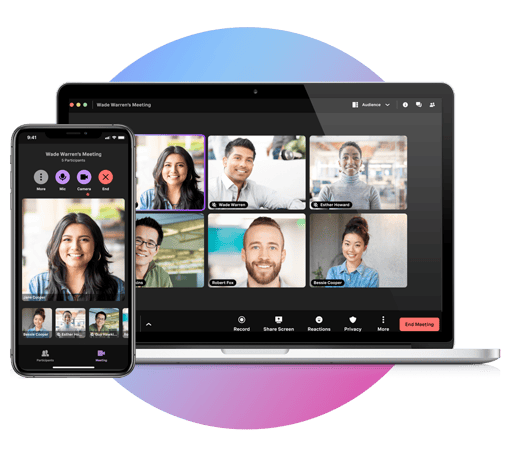
You’ve Introduced a Remote Work Policy or Have Staff Who Want to Work From Home
Want to take advantage of all the benefits of having a remote or hybrid workforce? You need a solution that enables distance working. Before you even think of introducing such a policy for your call center, you should make sure you have the right kind of system in place to make it work.
In a traditional call center, customer service representatives have to use specific equipment. With a VoIP system, your agents can access their accounts via the internet using any device, meaning they don’t need to be on site.
That means more flexibility for your teams, while your customers enjoy the same, high-quality service they always did.
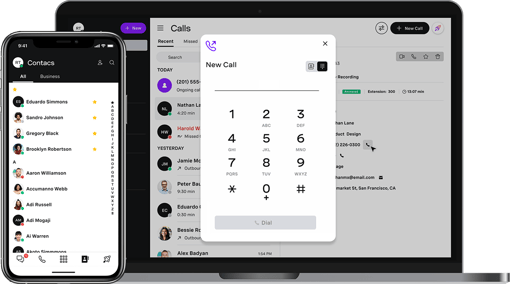
You Intend to Rapidly Scale Your Business
Entering a fast growth phase can be great news, but only when you can scale up your service levels accordingly. One of the biggest challenges of trying to build up your business fast, is that old solutions that worked before often can’t cope with increased operational complexity.
Scalability is one of the greatest advantages of using VoIP call center software. Since you can add new users in just a few clicks, you can get your new agents ready to go much faster than you could with a traditional call center setup.
The flexibility to dial up your communications system — pun intended — in line with more complicated requirements takes the stress out of the process.
Considerations When Choosing a VoIP Call Center Solution
Of course, features aren’t the only consideration when you’re choosing a VoIP call center system. You also need to think about:
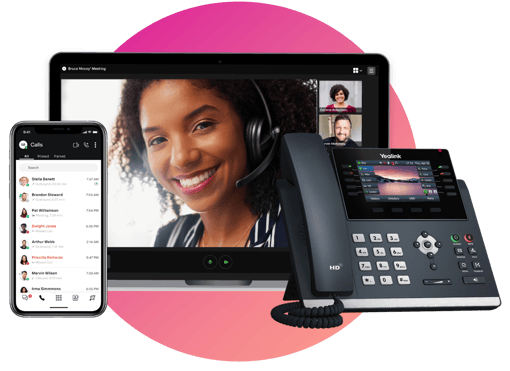
Onboarding and Support
Your chosen system may have a wealth of features, but if the onboarding process is heavy-going, that’s a strike against it. You need to be able to have confidence that setting up and getting started will be smooth and seamless. After all, you have a business to run, and you want as little disruption as possible.
Similarly, having support available when you need it is essential. Some vendors provide round-the-clock support, whereas others limit their service to standard business hours.
So, before you commit to buying your VoIP call center solution, make sure to research what support is available and whether it’s right for your situation.
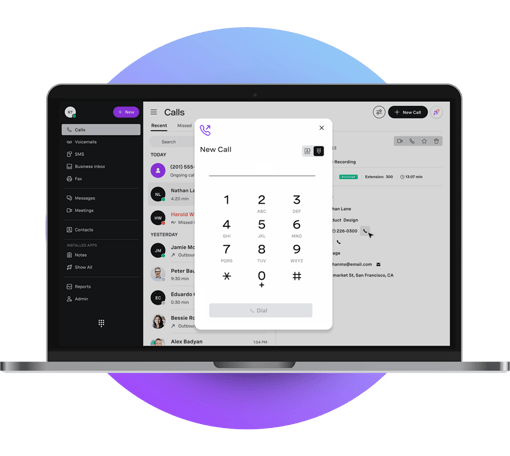
Value for Money
Every business decision you make has an impact on the bottom line. With whatever call center solution you choose, you have to know that you’re getting value for your money.
Obviously, moving from a legacy phone line system to a VoIP one is a major shift, so drilling down into the details of the numbers is crucial.
You’ll generally find that installation fees are fairly low since VoIP systems use the already existing internet infrastructure — but there could well be an account activation fee.
Watch out for additional costs that may apply to your business in particular, such as hidden activation fees. Make sure you fully understand all costs before making your choice.
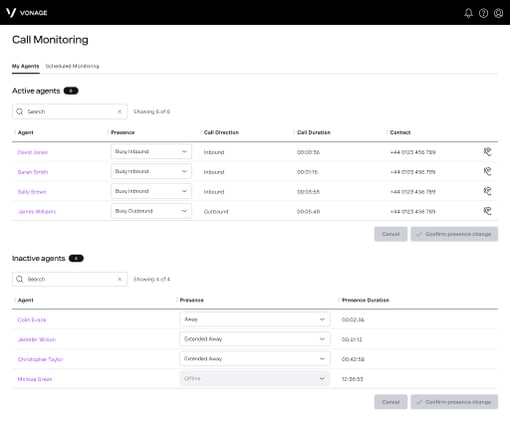
Security and Compliance
One of the key benefits of adopting a VoIP call center is that you no longer have to budget for the expense of running on-site infrastructure. But that does mean that you don’t have full control over network security.
When moving to a third-party hosted VoIP call center, it’s absolutely critical to select a trustworthy partner that takes security seriously.
Look for a service that uses high-level encryption. Good vendors will be completely transparent about the level of security you can expect at different tiers of service. Your job is to select the degree of security appropriate for your data.

Integrations With the Tools You Already Use
You’re already running a variety of applications that are familiar to your teams and work well. Your new system needs to play nicely with them. In fact, this tends to be a strength of many VoIP services, which often come with multiple integrations.
The exact list of integrations available will vary from service to service. It’s vital to choose one that dovetails with the apps you already use.
If you use Salesforce, for example, make sure you choose a VoIP solution that comes with a Salesforce integration rather than one that favors another CRM.
How Does VoIP Call Center Pricing Work?
Call center VoIP rates vary widely, but there are some common patterns.
Typically, you’ll pay your vendor a monthly subscription fee based on the number of users and the level of service you need. There are usually several tiers of service options, starting with a basic level that will let you access the main features, and a premium option for those looking for something more.
At Vonage, we offer a range of pricing plans. There’s the Mobile plan as a starter option, with Premium and Advanced alternatives for businesses that need additional functionality. You can also purchase add-ons to fully customize Vonage Business Communications into precisely the VoIP call center solution you need.
For larger businesses and enterprises, there’s Vonage Contact Center to help you meet more complex needs and build a more specialized solution.
The Right VoIP Call Center Solution Can Help Your Employees and Your Customers
Keeping your customers and employees happy is what it’s all about. Making the switch to the ideal VoIP call center for your business will make life easier for your callers, while letting your agents know you value and appreciate them.
So why not get started today? Connect with a Vonage expert to discover how you can customize VBC into a call center platform that takes your customer service to new heights.
FAQs About VoIP Call Centers
A call center focuses on helping customers over the phone. Despite the fact we’re living in a multichannel world, this is still one of the most popular ways for customers to try to resolve an issue.
Nevertheless, it’s always a good idea to give your customers as many options as they might want. That’s where a contact center comes in. With a contact center, customers can use a variety of methods for getting in touch such as via email, live chat, or social media platforms.
You can categorize call centers in a number of different ways, depending on their purpose or function. This could include:
- In-house or third-party: Some businesses prefer to directly employ their customer service agents, whereas others like to outsource.
- Inbound or outbound: Whether the calls are mostly coming in (e.g., customer service) or going out (e.g., sales).
- Automated or human: Some organizations use fully automated call centers rather than employ agents.
VoIP call center technology can be adapted for use in any type of call center.
Unified Communications as a Service (UCaaS) and Contact Center as a Service (CCaaS) are technically slightly different, but they work well together.
UCaaS is a more general communications solution for your business as a whole, whereas CCaaS is dedicated specifically to your contact center.
When contemplating which of the UCaaS and CCaaS options to go with, bear in mind that you don’t have to choose. By leveraging a UCaaS solution that encompasses CCaaS functionality, all communications across your organization will be seamlessly aligned.